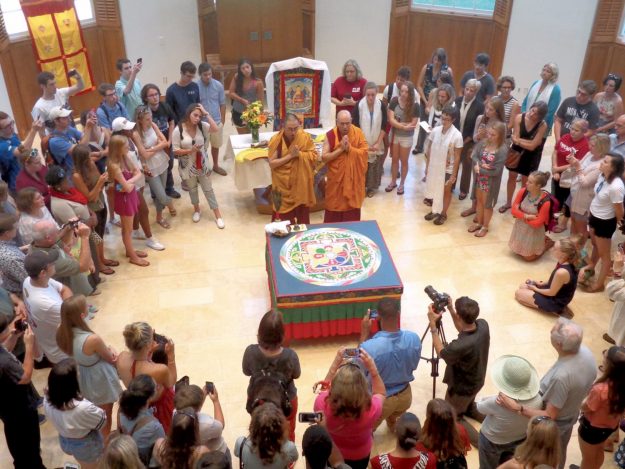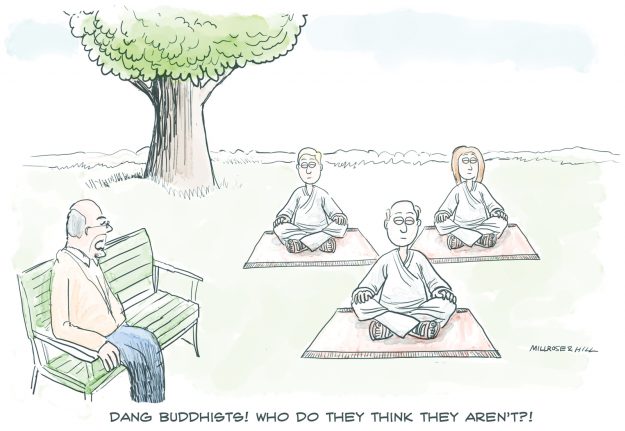In Tricycle’s Summer 2020 issue, religious studies professor and Shin Buddhist priest Jeff Wilson discussed “The Merit Economy,” which has sustained Buddhist institutions for centuries, and examined how it faces new challenges in the Western world. Generated through ethical deeds, merit is the karmic ingredient that leads to one’s favorable rebirth and overall good fortune. Because of their commitment to Buddhist practice, monks and nuns have more opportunities to accrue merit than laypeople, whose lifestyles leave less time for spiritual cultivation. For the laity, the best way to generate merit is through dana (Pali, Skt., “giving”), especially in the form of donations to monastic communities.
In effect, this establishes a system in which laypeople materially support monastics and monastics spiritually support laypeople. But in the West, where merit and rebirth are not as central to practitioners’ beliefs as they are in traditionally Buddhist cultures, many dharma groups have had to find new ways to sustain themselves. This change, Wilson stressed, is monumental in Buddhism’s history.
Some readers shared their objections to Wilson’s characterization of the concepts of merit and dana as well as their role in Western Buddhism. Here are two responses, edited for length.
Sarah Conover, Tricycle contributor and Theravada practitioner: Jeff Wilson has chosen two ends of a transactional stick to create his thesis: the Chinese Tiantai Buddhist network, known for selling indulgences, and a Zen abbot who was a paid employee. In portraying the issue along that continuum, he has missed a whole field of real dana, generosity, and merit, in a way that damages those core Buddhist concepts and misleads the reader.
In my view, Buddhism in the West is on its way to cleaning up the “merit transaction economy” that Wilson points to and growing something very beautiful and in line with what the Buddha taught. Dana and merit—both perhaps understood as acts of goodness—in the West are yet experiments that differ between denominations. Wilson’s article explains some of that confusion. But the article is demeaning to ardent monks and nuns, especially those whose supporters do not believe in transactional merit but are inspired by the goodness they feel in their teachers’ presence and teachings.
Wilson’s article approaches a single aspect of merit, but not the original teachings or any examples of what real merit and dana might look like, leaving us with a sour taste and not much of a vision for the future.
Ajahn Dhammadharo, an Australia-based monk in the Thai Forest tradition of Theravada Buddhism: Jeff Wilson presents information about a genuine problem: the financial struggles of some Buddhist centers. But is this article descriptive or prescriptive? Is Buddhism on the way to being a fee-for-service operation or should it be? He writes: “The loss of merit substantially undermines the foundations of traditional Buddhist ethics . . . creating the need for major reconstruction.” Well, the first part was right. How about a renaissance of the original?
There are modern examples of fully dana-based Buddhist institutions, but he doesn’t mention them. The Thai Forest tradition, for instance, has survived and thrived in materially impoverished places and circumstances. We only need enough support to survive. The article shows an almost willing ignorance of this principle. An experience of my own: One of the teachers at a center told me that when they switched from charging fees to a completely donation-based model, it did not negatively impact their financial situation; another teacher told me they actually had more money coming in than before.
“True goodness is not a zero-sum game, in which one person has to lose for another to gain.”
The depiction of merit as an economy—in which monks do the labor of merit-production and selling on the one hand and laypeople do the buying on the other—is misleading in another, subtler way, too. Wilson gives this away: Although he compares merit to a kind of currency, he admits that this currency is not “totally rational,” because giving it away actually increases it. But that is the point: It isn’t money, so it need not conform with the dynamics of monetary exchange in order to be rational. Is there anything irrational about the flame of one candle being used to light another—and another, and another, and so on—without diminishing its own glow?
True goodness, unlike other commodities, is not a zero-sum game, in which one person has to lose for another to gain. The more brightness one person generates, the better for everyone around them; it can be both taught and caught without anyone losing out.

In “Broadening the Field of Buddhist Studies” (Winter 2020), Tricycle’s editorial assistant, Emily DeMaioNewton, reported on the trend of Buddhist studies departments becoming increasingly interdisciplinary, and how that trend can be traced back to the pioneering scholar Richard Robinson. Charles Prebish, a Tricycle contributor, prominent Buddhist scholar, and Robinson’s former research assistant, wrote in to share his appreciation for the “interesting and informative” article. “I do wish, however, that you would have contacted a few of Richard Robinson’s students who could have provided you with a ‘ton’ of information,” he wrote. “I’m sure your article will be very useful to Tricycle readers, but I do believe there’s so much more you could have done.” For those looking to learn more about “the scholars who have shaped the discipline of Buddhist Studies over the past fifty years,” Prebish recommended visiting the website H-Buddhism. The site’s many resources include a section titled “Generations of Buddhist Studies,” in which “there are—so far—about forty chapters of biographical reminiscence by leading Buddhist Studies scholars,” he wrote, adding, “There are about another fifty chapters to be written in the near future.”
The world is changing rapidly, as Tricycle contributor Curtis White is acutely aware. Beginning as a eulogy for the seemingly forgotten classics of Western literature and fine arts, White’s essay “Living in a World That No Longer Exists” (Winter 2020) ultimately finds that while a culture’s tastes may transform, art’s beauty endures. Reader Ryan Elizabeth commented, “This piece is absolutely beautiful—a meditation in its own right.” As an artist who studied creative writing and philosophy in college, Elizabeth found the article to be particularly resonant. “I am only 32 and find that with each passing day the world shifts immeasurably around me,” Elizabeth wrote. “Even as a child, I felt a sense of wonder at this ever-changing nature. Perhaps this is why the Buddha’s teachings always felt direct and deeply understandable. . . . Your writing is medicine for those of us who don’t believe in the concept of ‘outdated’ writing styles of yesteryear.”
An article by former Theravada Buddhist monk and journalist Matthew Gindin, titled “Opinion: Buddhists Can Be Happy Trump Lost,” generated a firestorm of feedback from readers—with nearly five hundred comments on a Facebook post for the story alone.
“The dharma teaches interdependence and the clear-eyed understanding of causality: what actually leads to what,” Gindin wrote. “Surely we should ask ourselves what political platforms and principles most accurately reflect these teachings. We should not fear asking what political trends resonate with the dharma, but we can be cautious in answering the question.”
Many readers disagreed.
Dandy Melgo asserted on Instagram that the Buddha was not “in any way” political after he gained enlightenment. “Politics is divisive—it thrives on conflict. The Buddha was the opposite,” he wrote. Stefano Notarbartolo responded that “multi-party democracy is divisive, not politics. At the time of the Buddha there were no parties but councils where those in charge discussed the laws. Similarly, in the sangha the Buddha was the leader, but he listened to what others had to say.”
Kaushinie Renuka Panditaratne, who, according to Facebook, lives in Lübeck, Germany, wrote, “Your article unfortunately sounds disrespectful, condescending, and arrogant. The view of Buddhism you portray, which has been mostly expressed here, is nothing more than cultural misappropriation.”
In response to one assertion that Buddhists have historically been nonpolitical, the Tibetan Buddhist nun Ayya Yeshe, director of the Bodhicitta and Kalyanamitra foundations, wrote, “You do know that many lamas ruled [Tibet] and had their private monk armies, right?”
Kurt Spellmeyer, a Zen priest and professor of English at Rutgers University wrote: “The long sweep of Buddhism’s social history is not well understood in the West. But I would recommend that readers who take offense at this excellent article study the role Buddhism played in India and China, a persistently anti-authoritarian role, or so many historians have argued.”
Spellmeyer, a Tricycle contributor, continued: “Although the caste system had not fully formed during the Buddha’s lifetime, Buddhism remained throughout its two millennia on the subcontinent the most effective and articulate opponent of brahmanism and the caste system it promoted, and the dharma’s view of women was highly progressive, especially compared with the patriarchy of its brahmanist opponents. In India, Buddhism was the religion of the cosmopolitan urban middle class, typically merchants and professionals, and it celebrated what we call ‘diversity’ and ‘mobility.’ By contrast, brahmanism was the religion of the rural elite, the aristocracy, and the feudal oppressors. In our time, progressives recognize the dharma as a natural ally for a good reason: it is one. The historical project of both groups is the same—liberation, in every sense of the word.”
Other readers commented on the former president specifically.
“It seems that the net amount of suffering (globally and in the US) has increased under Donald Trump’s presidency,” David Koffer wrote on Facebook. “That, more than anything, is my principal reason for joy at his election loss.”

The Question
If you could ask the Buddha one question, what would it be?
Are you happy that your teachings became a religion, or not? —Mike Calabrese
We now know that people have very different brains. Do you have any advice about practicing for those with ADHD or autism? —Justin White
Did you ever feel that your quest was unfair to your wife, Yashodhara, and your son, Rahula, who had to lead lonely lives while you were gone? —Durgesh Kasbekar
Given that psychedelics weren’t widespread in your time and given the growing body of data on their benefits for healing psychological suffering, do you see psychedelics as a help or a hindrance on the path? —Clever Creature Podcast (Jason Gots)
🙏🏾 No questions. —Patricia George Brief
Do you like Beyoncé? —@jakefullertonhemet
For the next issue:
What’s your favorite line from a Buddhist poem?
Email your brief responses to editorial@tricycle.org, post a comment on tricycle.org, or tweet us at @tricyclemag.